====================
A homily offered by the Rev. Dr. C. Eric Funston on the Sixteenth Sunday after Pentecost, September 4, 2016, to the people of St. Paul’s Episcopal Church, Medina, Ohio, where Fr. Funston is rector.
(The lessons for the day are Proper 18C of the Revised Common Lectionary: Deuteronomy 30:15-20; Psalm 1; Philemon 1-21; and St. Luke 14:25-33. These lessons may be found at The Lectionary Page.)
====================
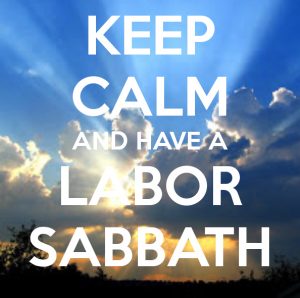 “Whoever comes to me and does not hate father and mother, wife and children, brothers and sisters, yes, and even life itself, cannot be my disciple. * * * None of you can become my disciple if you do not give up all your possessions.”
“Whoever comes to me and does not hate father and mother, wife and children, brothers and sisters, yes, and even life itself, cannot be my disciple. * * * None of you can become my disciple if you do not give up all your possessions.”
Jesus just doesn’t make it easy, does he? He doesn’t make it easy to preach this Gospel of his; he doesn’t make it easy to life this life of his! He just doesn’t.
And then there’s Paul! Sending a slave back to his owner, a slave who apparently ran away and owes his owner something. And Paul doesn’t even say to the slave owner, “Set him free.” He sort of hints at it, I guess, but he doesn’t come right out and say it! He doesn’t make this any easier.
And, of course, there’s Moses: “I have set before you today life and prosperity, death and adversity.” One way or the other, black or white, yes or no, no grays, no (as my mother would have said) “ifs, ands, or buts,” no compromises, no negotiations. Take it or leave it. Decide.
They don’t make it easy.
So let’s just ignore them, OK. It’s Labor Day weekend, so let’s just not work that hard.
Labor Day, as you already know because you read the parish’s weekly email update on Friday, was created by Congress in 1894 as a “workingman’s holiday” on the first Monday of September and has remained so for 122 years. In 1909, the American Federation of Labor adopted a resolution calling on churches to observe “Labor Sunday” on the day before Labor Day, and nearly every denomination including our own did so. The prior year the Federal Council of Churches had adopted the “Social Creed of the Churches” which called for “equal rights and complete justice for all men in all stations of life,” a living wage, abatement of poverty, and numerous worker protections, including arbitration, shortened workdays, safer conditions, the abolition of child labor, regulation of women’s labor, and assistance to elderly and incapacitated workers. “Labor Sunday” fit right in with those lofty social goals.
Observance of Labor Sunday waned in the 1960s; today (to the best of my knowledge) it is an official observance only in the United Church of Christ. We, however, have paid homage to this heritage when we sang the hymn Divine Companion as our Sequence a few moments ago. It was written by Henry Van Dyke in 1909 as a “Hymn of Labor” and set to the American folk hymn melody Pleading Savior which dates from before the Civil War. Let me read again Van Dyke’s lyrics:
Jesus, thou divine Companion,
by thy lowly human birth
thou hast come to join the workers,
burden-bearers of the earth.
Thou, the carpenter of Nazareth,
toiling for thy daily food,
by thy patience and thy courage,
thou hast taught us toil is good.Where the many toil together,
there art thou among thine own;
where the solitary labor,
thou art there with them alone;
thou, the peace that passeth knowledge,
dwellest in the daily strife;
thou, the Bread of heaven, art broken
in the sacrament of life.Every task, however simple,
sets the soul that does it free;
every deed of human kindness
done in love is done to thee.
Jesus, thou divine Companion,
help us all to work our best;
bless us in our daily labor,
lead us to our Sabbath rest.
(Episcopal Hymnal 1982, No. 586)
So, I guess if we really mean it – if St. Augustine is right that the one who sings his prayer prays twice – and we expect Jesus to lead us, then I guess we really are going to have to take up our cross. We are going to have to figure out what Jesus meant when he demanded that we hate our families and our possessions. We are going to have to wrestle with whatever it was Paul was up to with Philemon and Onesimus; and we are going to have to make that decision between “life and prosperity, death and adversity.”
Deuteronomy is the last of the five books of the Law, the Torah. It is said to be Moses’ farewell discourse to the Hebrews whom he has led across the desert to the Holy Land, which they (but not he) are about to enter. He is here addressing the entire people of God. But he is not speaking to them collectively; he uses the second person singular “you” in this text. He is here speaking of a personal, not community, decision, one each person must make for him- or herself. In the words of Woodie Guthrie:
You gotta walk that lonesome valley,
You gotta walk it by yourself,
Nobody here can walk it for you,
You gotta walk it by yourself.
Moses’ advice to the Hebrews, to each individual Hebrew, is “Choose life so that you and your descendants may live, loving the Lord your God, obeying him, and holding fast to him.” Lutheran bible scholar Terrence Fretheim says of this text:
Two possible futures are laid out in this text: life and death (Deuteronomy 30:15; 30:19). Note that the future is not laid out in absolute certainty — as if God knows that future in detail and could describe it to the people right now. The future is noted in terms of possibilities. What Israel says and does will give shape to that future, but what that shape will be is not determined in advance; that future remains open to what happens within the relationship, even for God. (Working Preaching Commentary)
Fretheim points out that it is worth noting that Deuteronomy does not say how the Hebrews responded to Moses. The story is open-ended. The book, and thus the Torah, ends with uncertainty regarding what Israel’s response is or will be. Thus, this personal decision is an open-ended question not only for the Hebrews but for us today; each and every reader, every person who hears Moses read, is called to provide an response.
And that is basically what Jesus is recalling to his listeners; he is reminding the large crowd of Israelites following him on the road and he is reminding us of the stark reality of the choice Moses had set out for them and for us centuries before. He has phrased it differently, using rabbinic hyperbole, but the choice is the same: life or death; following the way of God or the way of the world symbolized by “father and mother, wife and children, brothers and sisters” and all of one’s possessions.
We, and I’m sure Jesus’ first listeners, are shocked by this language of “hate.” We cannot help but think of the fifth Commandment: “Honor your father and your mother” (Exod. 20:12; BCP 1979, Pg. 350) and this hardly seems consonant. We are naturally affectionate toward our parents, our siblings, and our children. But Greek scholar D. Mark Davis points out that in many instances in the Bible, in both Old and New Testaments, “hate” is used without the emotional content we habitually invest in it. Davis writes:
This use of “hate,” where there are two possibilities and one must choose decisively, seems to be the dynamic at work in our text. The full commitment to one possibility means the severance of commitment to another possibility. (Left Behind and Loving It: Holy Hating)
What is demanded by Jesus is not enmity and malice, but rather detachment. How is this to be acted out? Davis suggests:
[T]his call to discipleship is radical, implying that those who follow Jesus are not going to be making decisions based on “what’s best for me,” or even “what’s best for our marriage/family/children.” It may mean living in that “dangerous neighborhood” or attending a less achieving school, because a gracious presence is needed there. It may mean living more simply because one’s resources can be used better for others. It may mean making unpopular choices despite the protests of one’s family. This is real and critical engagement that Jesus is talking about, a stark contrast to the typical depiction of “the happy Christian home” where one’s faith is demonstrated by how committed on is to providing every possible advantage to one’s own. That kind of choosing, it seems to me, has to be cast in the strongest language possible, because we will domesticate the gospel and make it a matter of enhancing ourselves and our families until we hear this kind of extreme language and let it shake us. (Ibid.)
Using parallel structure, Jesus offers a second metaphor to explain his expectations: “Whoever does not carry the cross and follow me cannot be my disciple.” Again, we must wrestle with what this means, especially because it is so often twisted by the popular expression, “It’s my cross to bear,” making it almost equivalent to another popular expression which twists Paul’s complaint of “a thorn in my flesh.” (2 Cor 12:7) But as seminary professor Karoline Lewis reminds us, carrying the cross “cannot only be located in suffering and sacrifice when the biblical witness suggests otherwise.” (Dear Working Preacher: Carrying the Cross) In terms echoing Mark Davis’ interpretation of what it means to “hate” our families, Lewis says:
[C]arrying your cross is a choice and ironically, it is a choice for life and not death. But here is the challenge. We tend toward saying the cross is a choice for life because it leads to resurrection. Yes. And no. Yes, this is what God has done – undone death for the sake of life forever. But no, if that reality has no bearing on your present. (Ibid.)
Thus, to “carry the cross”
. . . could mean to carry the burdens of those from whom Jesus releases burdens. It could mean to carry the ministry of Jesus forward by seeing those whom the world overlooks. It could mean favoring and regarding the marginalized, even when that action might lead to your own oppression. (Ibid.)
It might mean defending equal rights and complete justice for all people in all stations of life, a living wage, abatement of poverty, worker protections, arbitration, shortened workdays, safer working conditions, the abolition of child labor, protection of voting rights, and assistance to the elderly and incapacitated, even if that might lead to higher taxes.
And that is the reality that Paul lays before Philemon in his letter returning the slave Onesimus to his household. Paul addresses Philemon as a “dear friend and co-worker,” as a leader of a church group that meets in his home, as someone filled with “love for all the saints and . . . faith toward the Lord Jesus.” And then like Moses addressing each of the Hebrews individually, like Jesus addressing the Israelites following him on the road, Paul says to Philemon, “You have a choice to make.” In his case, of course, the choice is whether to free Onesimus.
The traditional understanding of the situation addressed in this letter is that Onesimus (whose name means “Useful,” by the way) had run away, had somehow come into Paul’s service during Paul’s imprisonment, and was now being sent back to his owner. The letter doesn’t actually describe the situation that way, but verse 18 (“If he has wronged you in any way, or owes you anything, charge that to my account.”) is taken to support that view. Another interpretation of the text, however, is that Philemon had sent Onesimus to Paul for a period of time and Paul, honoring that time limit, is returning him: “I am sending him, that is, my own heart, back to you,” writes the apostle.
In any event, Onesimus is a slave who, like his master, has become “a beloved brother … in the Lord.” Onesimus in his conversion, in his “transformation is a vivid embodiment of the gospel. He is a walking reminder of the power of the good news.” (Eric Barreto, Commentary)
According to seminary professor Eric Barreto,
For Paul, what happens in these Christian communities [like the one that meet is Philemon’s home] is a matter of life and death. His letters are not just doctrinal. He’s not just concerned with ideas, with the right Christological or theological or eschatological perspective. Paul is a pastor, remember. He cares for these communities because these communities are seeds of the resurrection, sites where the resurrected life can already flourish, places of resistance to an empire that would place us in rank according to social status. (Ibid.)
And so he places before Philemon a choice, not unlike the decision Moses laid before the Hebrews, not unlike the choice Jesus gave those folks following him on the road. It no longer matters who Onesimus’ or Philemon’s father or mother may have been, who their children or their siblings are. It no longer matters what they possess; what matters is who possesses them. They have both been baptized into the Body of Christ; they are both belong to the Lord of life.
Professor Fretheim pointed out that we are not told what decision the Hebrews made and so their choice becomes an open-ended question. Likewise, we are not told what the people on the road with Jesus chose, nor do we know what Philemon decided to do. In each story, the choice is the same – life or death – and each story calls us to make the same choice.
For generations, the Jews have had a toast: “L’Chaim!” It simply means “To Life!” Every time I read this letter, I can almost see Paul putting down his pen as he finishes writing, reaching for his cup, lifting it up to the absent Philemon, and offering the toast unspoken in the letter itself: “L’Chaim! Choose life! Take up your cross! Set Onesimus free!”
Every task, however simple,
sets the soul that does it free;
every deed of human kindness
done in love is done to thee.
Jesus, thou divine Companion,
help us all to work our best;
bless us in our daily labor,
lead us to our Sabbath rest.
Let us pray:
Almighty God, you have so linked our lives one with another that all we do affects, for good or ill, all other lives: So guide us in the work we do, that we may do it not for self alone, but for the common good; and, as we seek a proper return for our own labor, make us mindful of the rightful aspirations of other workers, and arouse our concern for those who are out of work; through Jesus Christ our Lord, who lives and reigns with you and the Holy Spirit, one God, for ever and ever. Amen. (BCP 1979, Pg. 261)
====================
A request to my readers: I’m trying to build the readership of this blog and I’d very much appreciate your help in doing so. If you find something here that is of value, please share it with others. If you are on Facebook, “like” the posts on your page so others can see them. If you are following me on Twitter, please “retweet” the notices of these meditations. If you have a blog of your own, please include mine in your links (a favor I will gladly reciprocate). Many thanks!
====================
Father Funston is the rector of St. Paul’s Episcopal Church, Medina, Ohio.
 Our reading from the Book of Isaiah today is the second half of chapter 58, a chapter which begins with God ordering the prophet to “Shout out,” to “do not hold back,” to “lift up [his] voice like a trumpet” with God’s answer to a question asked by the people of Jerusalem: “Why do we fast, but you do not see? Why humble ourselves, but you do not notice?” (Isaiah 58:1,3a)
Our reading from the Book of Isaiah today is the second half of chapter 58, a chapter which begins with God ordering the prophet to “Shout out,” to “do not hold back,” to “lift up [his] voice like a trumpet” with God’s answer to a question asked by the people of Jerusalem: “Why do we fast, but you do not see? Why humble ourselves, but you do not notice?” (Isaiah 58:1,3a) In philosophy and theology there is an exercise named by the Greek word deiknumi. The word simply translated means “occurrence” or “evidence,” but in philosophy it refers to a “thought experiment,” a sort of meditation or exploration of a hypothesis about what might happen if certain facts are true or certain situations experienced. It’s particularly useful if those situations cannot be replicated in a laboratory or if the facts are in the past or future and cannot be presently experienced. St. Paul uses the word only once in his epistles: in the last verse of chapter 12 of the First Letter to the Corinthians, he uses the verbal form when he admonishes his readers to “strive for the greater gifts. And I will show you [deiknuo, ‘I will give you evidence of’] a still more excellent way.” It is the introduction to his famous treatise on agape, divine love, a thought experiment (if you will) about the best expression, the “still more excellent” expression of the greatest of the virtues.
In philosophy and theology there is an exercise named by the Greek word deiknumi. The word simply translated means “occurrence” or “evidence,” but in philosophy it refers to a “thought experiment,” a sort of meditation or exploration of a hypothesis about what might happen if certain facts are true or certain situations experienced. It’s particularly useful if those situations cannot be replicated in a laboratory or if the facts are in the past or future and cannot be presently experienced. St. Paul uses the word only once in his epistles: in the last verse of chapter 12 of the First Letter to the Corinthians, he uses the verbal form when he admonishes his readers to “strive for the greater gifts. And I will show you [deiknuo, ‘I will give you evidence of’] a still more excellent way.” It is the introduction to his famous treatise on agape, divine love, a thought experiment (if you will) about the best expression, the “still more excellent” expression of the greatest of the virtues.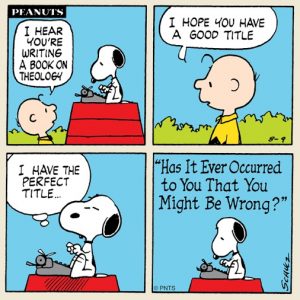 God’s response to Abraham’s challenge is to take Abraham outside and show him the stars and ask him, “Has it ever occurred to you that you might be wrong?” Well, God doesn’t, actually . . . but that’s what it boils down to. God’s response to Abraham is, “Thank again!”
God’s response to Abraham’s challenge is to take Abraham outside and show him the stars and ask him, “Has it ever occurred to you that you might be wrong?” Well, God doesn’t, actually . . . but that’s what it boils down to. God’s response to Abraham is, “Thank again!”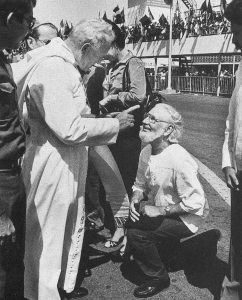 When Pope John Paul II scolded Fr. Cardenal upon the his arrival in Nicaragua, it was because Cardenal had collaborated with the Marxist Sandinistas and, after the Sandinista victory in 1979, he became their government’s Minister of Culture. His brother, Fr. Fernando Cardenal S.J. also worked with the Sandinista government in the Ministry of Education, directing a successful literacy campaign. There were a handful of other priests working in the government, as well.
When Pope John Paul II scolded Fr. Cardenal upon the his arrival in Nicaragua, it was because Cardenal had collaborated with the Marxist Sandinistas and, after the Sandinista victory in 1979, he became their government’s Minister of Culture. His brother, Fr. Fernando Cardenal S.J. also worked with the Sandinista government in the Ministry of Education, directing a successful literacy campaign. There were a handful of other priests working in the government, as well. 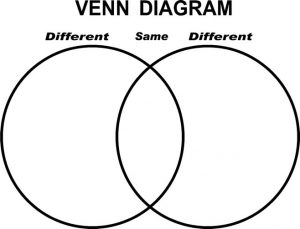 We know that if there are tribal circles on that foundational paper, they are more like the circles on a Venn diagram, not only touching but overlapping. That was true of the ancient Hebrews; their tribalism might demand ethnic purity, but they never achieved it; the Old Testament demonstrates that, again and again! Modern ideological tribalism is no different. Ideologies, religious beliefs, political opinions differ in many ways, but in many others they share much in common; they overlap. People’s lives and opinions overlap, but ideological tribalism encourages us to hear only the differing opinions and blinds us to our similar lives.
We know that if there are tribal circles on that foundational paper, they are more like the circles on a Venn diagram, not only touching but overlapping. That was true of the ancient Hebrews; their tribalism might demand ethnic purity, but they never achieved it; the Old Testament demonstrates that, again and again! Modern ideological tribalism is no different. Ideologies, religious beliefs, political opinions differ in many ways, but in many others they share much in common; they overlap. People’s lives and opinions overlap, but ideological tribalism encourages us to hear only the differing opinions and blinds us to our similar lives.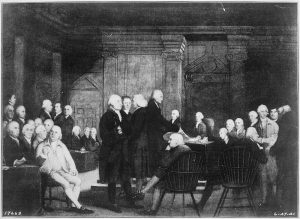 Last Monday, we celebrated our country’s 240th birthday in a way that is quite different from other celebrations of what we might call “national identity days” around the world.
Last Monday, we celebrated our country’s 240th birthday in a way that is quite different from other celebrations of what we might call “national identity days” around the world.  As many of you know, this past week was a harrowing one for my wife and for me; specifically, Wednesday was one of those days you would rather not have to live through. In the afternoon, I was told by a urologist that I probably have prostate cancer, and later that night Evelyn nearly died from pulmonary embolism. She is OK now – I will be leaving right after this service to bring her home from the hospital – and my diagnosis will be either confirmed or proven wrong by a biopsy in about a month.
As many of you know, this past week was a harrowing one for my wife and for me; specifically, Wednesday was one of those days you would rather not have to live through. In the afternoon, I was told by a urologist that I probably have prostate cancer, and later that night Evelyn nearly died from pulmonary embolism. She is OK now – I will be leaving right after this service to bring her home from the hospital – and my diagnosis will be either confirmed or proven wrong by a biopsy in about a month.  As a human body moves, its tissues or organs normally move and shift, repositioning themselves in relation to one another within a normative range; nothing in the body is static. These tissues and organs have slippery surfaces and natural lubricants to allow this. Inflammation, infection, surgery, or injury can cause bands of scar-like tissue to form between the surfaces of these organs and tissues, causing them to stick together and prevent this natural movement.
As a human body moves, its tissues or organs normally move and shift, repositioning themselves in relation to one another within a normative range; nothing in the body is static. These tissues and organs have slippery surfaces and natural lubricants to allow this. Inflammation, infection, surgery, or injury can cause bands of scar-like tissue to form between the surfaces of these organs and tissues, causing them to stick together and prevent this natural movement. 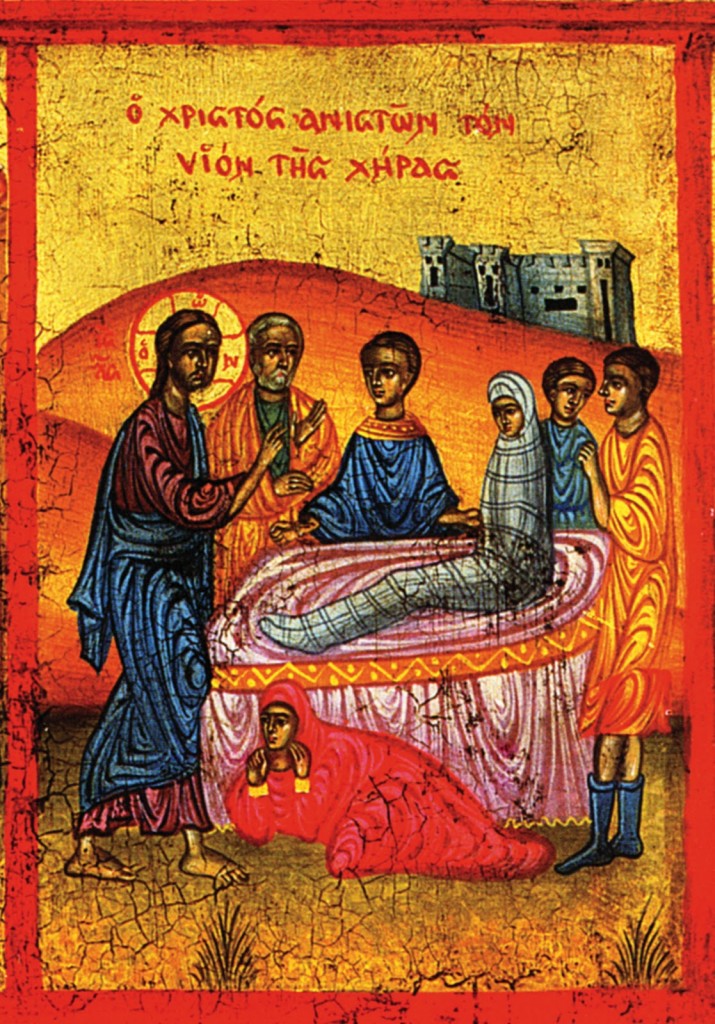 I am convinced that there is no grief quite so profound as that of a mother whose child has died. I know that fathers in the same situation feel a nearly as intense sorrow at the death of their sons or daughters, but having spent time with grieving parents, I am convinced that the grief of a mother faced with the loss of her child is the deepest sadness in human experience.
I am convinced that there is no grief quite so profound as that of a mother whose child has died. I know that fathers in the same situation feel a nearly as intense sorrow at the death of their sons or daughters, but having spent time with grieving parents, I am convinced that the grief of a mother faced with the loss of her child is the deepest sadness in human experience.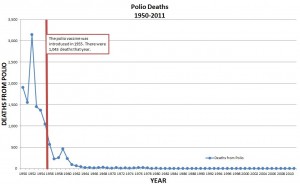 The year that I was born was the worst of the mid-20th Century polio epidemic; about 55,000 Americans contracted the disease that year and more than 3,100 died, mostly children. As a society, we decided that that much illness and death was simply unacceptable, and an all-out effort was underway to put an end to it. Within just a few years, Jonas Salk and his team developed the vaccine which ended the epidemic; a few years later, the Sabin oral vaccine was developed and polio has been just about eradicated throughout the world. (Graphic from
The year that I was born was the worst of the mid-20th Century polio epidemic; about 55,000 Americans contracted the disease that year and more than 3,100 died, mostly children. As a society, we decided that that much illness and death was simply unacceptable, and an all-out effort was underway to put an end to it. Within just a few years, Jonas Salk and his team developed the vaccine which ended the epidemic; a few years later, the Sabin oral vaccine was developed and polio has been just about eradicated throughout the world. (Graphic from 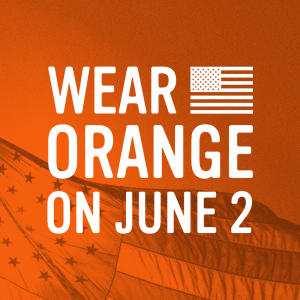 On January 21, 2013, Hadiya Pendleton, a 15-year-old high school student from the south side of Chicago, marched with her school’s band in President Obama’s second inaugural parade. One week later, Hadiya was shot and killed. She was shot in the back while standing with friends inside Harsh Park in Kenwood, Chicago, after taking her final exams. She was not the intended victim; the perpetrator, a gang member, had mistaken her group of friends for a rival gang.
On January 21, 2013, Hadiya Pendleton, a 15-year-old high school student from the south side of Chicago, marched with her school’s band in President Obama’s second inaugural parade. One week later, Hadiya was shot and killed. She was shot in the back while standing with friends inside Harsh Park in Kenwood, Chicago, after taking her final exams. She was not the intended victim; the perpetrator, a gang member, had mistaken her group of friends for a rival gang. 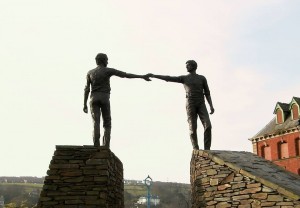 John the Baptizer came, Luke tells us, “proclaiming a baptism of repentance for the forgiveness of sins.” (Lk. 3:3) In today’s Gospel lesson, John tells the crowds who came to him, “Bear fruits worthy of repentance.” (v. 8) Our catechism teaches us that repentance is required of us to receive the Sacraments. With regard to baptism, the catechetical requirement is that we “renounce Satan, repent of our sins, and accept Jesus as our Lord and Savior;” with regard to the Holy Eucharist, that we “examine our lives, repent of our sins, and be in love and charity with all people.” (BCP 858, 860) But John’s admonition and the Catechism’s requirements leave us wondering, “What exactly is ‘repentance’?”
John the Baptizer came, Luke tells us, “proclaiming a baptism of repentance for the forgiveness of sins.” (Lk. 3:3) In today’s Gospel lesson, John tells the crowds who came to him, “Bear fruits worthy of repentance.” (v. 8) Our catechism teaches us that repentance is required of us to receive the Sacraments. With regard to baptism, the catechetical requirement is that we “renounce Satan, repent of our sins, and accept Jesus as our Lord and Savior;” with regard to the Holy Eucharist, that we “examine our lives, repent of our sins, and be in love and charity with all people.” (BCP 858, 860) But John’s admonition and the Catechism’s requirements leave us wondering, “What exactly is ‘repentance’?” 

